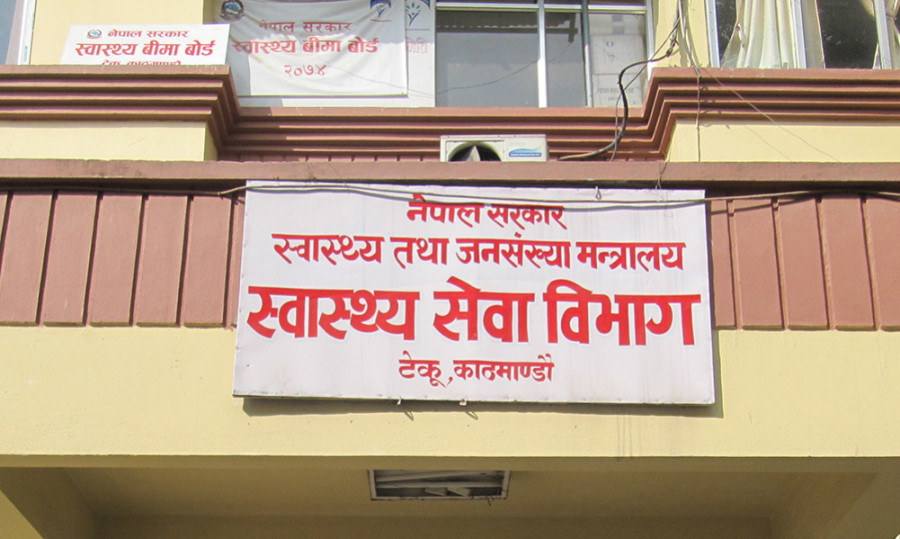Health
Nationwide study being conducted on soil-transmitted intestinal worm infections
The World Health Organisation will provide financial and technical support for the study, officials say.
Post Report
In a bid to assess the prevalence of intestinal parasites in children, the Ministry of Health and Population is preparing to carry out a nationwide study with financial and technical support from the World Health Organisation.
Health officials said that the study would be the first of its kind in Nepal, which will provide detailed insight into the prevalence of soil-transmitted helminth infection among children.
“We have been administering deworming tablets to children under five years, but are still in the dark about the actual disease prevalence,” said Lila Bikram Thapa, chief of the Nutrition Section of the Family Welfare Division of the Department of Health Services. “This study will help us understand the disease prevalence and assist in policy formation.”
Soil-transmitted helminth infections, or intestinal parasites, are the most common infections worldwide, from which poor and most vulnerable populations get affected the most. Ascaris lumbricoides, trichuris trichiura and hookworms are the causative agents of the said disease, according to the World Health Organisation. The diseases are transmitted by consuming contaminated water, uncooked foods and unwashed or unpeeled fruits and vegetables.
Adult worms live in the intestine, where they produce thousands of eggs every day. In areas that lack adequate sanitation, these eggs contaminate the soil.
Doctors say infected children are nutritionally and physically impaired. Girls and women of reproductive age suffer from anaemia, and blood loss is exacerbated if infected with intestinal worms, which ultimately increases the risk of maternal and infant mortality and low birth weight.
Despite the fact that deworming medicines are free in state-run health facilities throughout the country, people above five years of age generally do not take the medicines unless prescribed by physicians.
“During the Vitamin A supplementation programme, we administer deworming medicines to children under five years of age, but we do not administer to the rest of the population,” said Thapa. “Everyone should take the medicine every six months to avoid infections from intestinal worms, but very few people actually do.”
According to health officials, the upcoming study will target school-going children aged six and 9. At least 300 stool samples will be collected from both private and community schools in each province. They say the results of the study, which is set to start in the second week of May, are expected within September.
Health officials say that they will also coordinate with the Ministry of Education, Science and Technology, as health education is crucial to prevent infection and improve sanitation and hygiene conditions.
The UN health body has recommended periodic medical treatment, deworming, health and hygiene education and healthy behaviours.
Preparations for the study on soil-transmitted helminth infection are in full swing at a time when many crucial health studies have been either halted indefinitely or terminated due to funding suspension by the USAID.
Officials say the aid suspension and budget cut has affected Nepal’s major priority health programmes including those related to maternal and child health, immunisation, nutrition, HIV, tuberculosis, epidemic control, non-communicable diseases, and mental health.
Among the terminated programmes are key health surveys, including the micronutrient survey, which was planned over the past 10 years, the lymphatic filariasis transmission survey, and the promotion of exclusive breastfeeding at 18 major hospitals.
Awareness programmes targeting female sex workers, homosexual men, and other high-risk groups have also been halted.
Other affected programmes include ‘outbreak investigation training’ for doctors, neonatal care training for hundreds of doctors and nurses, and various programmes related to the Sustainable Development Goals, including maternal and child health, nutrition, reproductive health, and family planning. Programmes under the Integrated Health Information Management System have also been hit.
Health officials say an indefinite halt in health surveys and data collection puts the country in the dark about updated health indicators and affects efforts to track progress on Sustainable Development Goals (SDGs) targets.
SDGs, which build on the Millennium Development Goals (MDGs), aim to end poverty and hunger, and all forms of inequality in the world by 2030. Nepal has committed to meeting these targets.




 14.12°C Kathmandu
14.12°C Kathmandu














